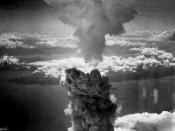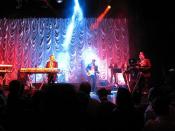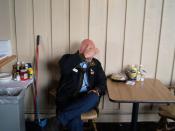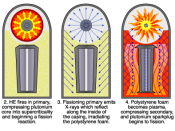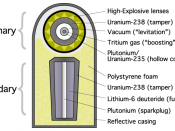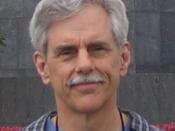The Secret that Exploded by Howard Morland "The Secret that Exploded" written by Howard Morland is a non-fiction book based on his findings on the H-bomb.
Howard dedicated his life to finding out the secret of the H-bomb and releasing his findings to the public who have been in the dark since the beginnings of the Manhattan Project. The book goes through everything he went through from when he became an airforce pilot to him becoming involved in radical groups to him fighting the government in court for freedom of press. His book goes through everything he had to do to get the information he needed to find out the secret of the H-bomb. Howard felt that if "He would attack secrecy; if secrecy could be dismantled, then the opponents of nuclear weaponry would have a fighting chance.
(pg.50)" He wanted to break down the secrecy of the government and give the radical groups that were against the bomb a chance to get there views heard around the U.S.
and possibly bring a stop to the nuclear arms race. Howard thought that the "secret of the H-bomb could be the centerpiece of the secrecy structure and that if he could crack it he could bring down the whole secrecy structure.(pg.50)" This is what he wanted and he wanted all of the secrets that the government has been keeping from the public to be revealed so that the public could know what was going on and not be in the dark.
Howard knowing that finding the secret would be near impossible moved on in his journey and visited every major nuclear manufacturing sight in the U.S. that he knew about.
On his journey he encountered problems with security. The government has bottled up the secret by giving security clearances to anyone who knew the secret. These people could not tell anyone anything that was deemed classified and they could get in very big trouble if they did. Howard had to get by this by asking questions that would bring back answers that wasn't classified material but the information that he needed. Howard got so good at asking questions that he eventually put together all the information he found out from all of his sources and put together his version of the H-bomb. This version was so near accurate that the government wanted to classify it so that Howard could not publish it in the The Progressive magazine. Howard and The Progressive took the government to the Supreme court where the government dropped their case because the info that they wanted to contain had already leaked out to the public.
Howard and The Progressive got what they wanted and earned the right to print their article that revealed the secret of the H-bomb.
One major theme in the book was how the U.S. and Russia both had so many nuclear bombs that they could end life on both continents and possibly the world and still have bombs left in their arsenal to do more damage. The carnage and the fallout of a nuclear bomb is devastating. As shown on page 276 one "Poseidon submarine in the Gulf of Mexico could kill 50 million Americans who live in the 17 largest cities in America. This attack would expend more explosive energy than all the wars of history, and still use less than 1% of the force of the U.S. Triad." If one sub could kill one fifth of the U.S. population then the amount of nuclear bombs that both Russia and the U.S. hold could kill every single person on the earth. Bernard Feld said that "Fifty to a hundred nuclear weapons, not ten thousand, were all we needed for deterrence.(pg.61)" If we only need a hundred H-bombs to deter the enemy then there is no reason for us to have ten thousand. Something has to be done to decrease the amount of bombs in our arsenal and the Russians. If a war was to break out the world would end and there would be total destruction. Some people don't understand that if we got in a nuclear war that there would be total destruction.
Everything and everybody will die. Just because we have more bombs than our enemy doesn't mean that we will win and survive. All the Russians need to do is get off about fifty bombs and more than half of the U.S. will be destroyed. The fallout afterwards would bring death to all around the world and the earth would become almost inhabitable. Howard saw this and tried to crack the governments secrecy so that they might start to listen to the public and reduce the nuclear threat.
Howard felt that the information that he discovered should be released to the public because it was public information. He stated that if he could go out and find the secret by just asking questions and looking in books that the government had not classified that any other person could go out and do the same thing. "The defense of The Progressive had to be base on a refutation of the government's case for censorship. The case quickly became a First Amendment contest, pure and simple; the real purposes of the article were summarily put aside, and we had to fight the case on constitutional grounds, on legal technicalities, and on the claim that the article was harmless.(pg.154)" The Progressive had to prove that if they printed this article that nothing would happen to danger national security and that even though the secret would be printed you still couldn't produce a bomb without the knowledge and the equipment that would make it possible to make one. The case started out with the government putting a temporary restraining order on the Progressive so that they could not publish the article. Then they went to the Federal District Court in Milwaukee. Any decision could be appealed to the Seventh Circuit Court of appeals in Chicago and then on to the Supreme Court. The government got it's TRO and the Progressive took the case all the way to the Supreme Court.
The Progressive was trying to prove that the secret to the H-bomb were already publicly accessible and that things that are already public can be published again and can not be deemed classified and that already published material could not hurt the security of the U.S. if it is published again.
While the case moved on and it moved all the way up to the Supreme Court, information that contained the secret leaked out and it was spreading throughout the U.S. and even Australia. When the case reached the Supreme Court someone published an article that released the secret to the public.
The government saw that it was useless to try and keep something from the public that was already out and accessible to the public. The government was forced to drop their case and The Progressive was allowed to publish Howard's article that finally released the best kept secret to the public.
I feel that Howard should have been allowed to print his article. He did get all of his information legally and he should have been able to print his article that released info any person doing the same thing could have found. The government couldn't have kept this secret from getting out.
Once people got the info and made copies of it then more and more people would learn the secret and there was no way that the government could have prevented the spread of this highly classified material. Once Howard brought this case to court people that knew the secret confirmed that Howard had the closest diagram of a H-bomb that they had ever seen.
Howard broke the secrecy of the government and broke the door open for the public being against government secrecy.
Howard convinced me that his methods of obtaining information was perfectly legal. He did nothing wrong and nobody who knew the secret told him anything that was deemed classified. He deducted from his findings and his personal knowledge a H-bomb. He also made me feel that the amount of nuclear weapons that we have in our arsenal today is totally unnecessary and that we should remove some of these bombs from our arsenal. We do not need the amount of bombs that we have to deter the enemy. It may feel safer that we have more bombs than our enemy but it really doesn't matter. The power and the fallout of nuclear weapons is devastating and only a few hundred bombs can devastate an entire continent.
I learned from this book that it is hard to keep something secret. Once something if discovered and just one person who is not sworn to secrecy discovers a secret it will most likely find its way to the public. I also feel that if someone can figure out a secret by legal means than they should be allowed by First Amendment rights to publish and info they find and feel that the public needs to know.
We haven't gone over anything like this in class yet but I would like to know if the government would have come out victorious if the secret did not get out to the public before the case was over. I felt that the defense did not have much of a defense and that they probably would have lost to the power of the government.
Howard was definitely against secrets and government.
It seemed as though he did not like a higher organization withholding information that he wanted to discover from him.
It seemed as though he was one of those hippies and he probably did some drugs when he was in all of those radical groups trying to find his calling.
I feel this book is of some value because it shows the power that we have as a country and our power to end all life on the face of the earth. It also shows the power of the government to suppress information given to the public.
It is kind of scary that the government in some way controls our lives by controlling what and what we don't see and what we know. The government is probably holding some many secrets from the public that the views of the nation would change if all of them were released.
I felt that the book was boring and that Howard did not do a good job in describing the trial and the events that took place during the case. He was more concerned on telling the secret and how he derived it than telling anything of importance that deals with our civil law class. I would not recommend this book to anyone that wants to read it for the legal aspects but I would recommend it to those would want to find out more about the H-bomb and what makes it tick.
Bibliography Morland, Howard; Random House Inc., 1981, p.288
